Feeling pain after a dental implant? Don’t worry —it’s normal. Most people feel swelling, pressure, or throbbing for a few days after surgery. Usually, dental implant pain lasts for 3 to 7 days, but mild soreness may stay up to two weeks. If your implant still hurts after that, it could be a sign of a problem.
Pain while chewing is common early on — soft foods and slow bites can help. You may also feel soreness in nearby teeth, but that often fades. Use simple relief tips like cold compresses, painkillers, saltwater rinses, and rest. If your implant pain throbs or worsens after two weeks, you should talk to your dentist fast.
Pain can mean healing, but it can also be a warning. Know the difference between normal pain and signs of infection or implant failure. This article shares easy home remedies, clear timelines, and 5 proven ways to feel better fast — even during chewing or brushing. Dental implant pain usually lasts 3–7 days and fades by two weeks. Pain lasting longer than 14 days may be a sign of complications.
Dental Implant Pain: Causes and Relief Tips
Dental implant pain is a common part of the healing process, especially right after surgery. But understanding why it happens and how to ease it can make recovery much smoother.Why does it hurt?
Pain often comes from your body reacting to the surgery. Dentists have to place the implant into the jawbone, which naturally causes swelling, pressure, and soreness around the area. In most cases, the pain is mild to moderate and lasts only a few days.
Some common causes of dental implant pain include:
- Tissue inflammation after surgery
- Tight stitches causing pressure
- Biting too hard or eating solid food too soon
- Minor infection or irritation at the implant site
Nearby teeth or nerves reacting to the implant placement
But the good news? The pain usually fades as healing begins.
Relief Tips to Feel Better Fast
Here are some easy ways to manage pain after a dental implant:
- Cold compress: Apply to your cheek in 15-minute breaks to reduce swelling.
- Pain medicine: Over-the-counter painkillers like ibuprofen can ease discomfort.
- Saltwater rinses: Gently swishing helps keep the area clean and fights infection.
- Eat soft foods: Avoid crunchy or sticky food for the first few days.
- Get enough rest: Let your body heal by avoiding heavy work or exercise.
Most people feel much better within a week. But if the pain gets worse instead of better or if there’s pus, swelling, or fever it’s time to contact your dentist.
Read: What are the 3 types of dental implants
What Causes Throbbing Pain After Dental Implant?
Throbbing pain after a dental implant can feel scary, but in most cases, it’s part of the normal healing process. The body naturally responds to surgery with inflammation, and that’s often what causes the throbbing feeling — like a heartbeat near the implant area.
Here’s why throbbing pain happens:
- Tissue Trauma: The implant is placed deep into the jawbone, so surrounding gums and tissues are disturbed. This triggers swelling and pain.
- Nerve Sensitivity: Nearby nerves may be slightly irritated during surgery, which can cause a pulsing or sharp pain for a few days.
- Post-Surgery Inflammation: Swelling builds pressure in the tissues, leading to a throbbing sensation — especially during the first 48 to 72 hours.
- Biting Too Early: Chewing hard or crunchy foods too soon can irritate the implant site, increasing pain and delaying healing.
- Minor Infection: Sometimes, if the area isn’t kept clean, a small infection may form, causing more intense throbbing, especially with warmth and swelling.
When is throbbing pain not normal?
While mild to moderate throbbing is expected for a few days, it’s important to look out for:
- Severe or increasing pain after 5–7 days
- Swelling that doesn’t go down
- Pus or bad smell around the implant
- Fever or chills
These may signal an infection or implant complication, and it’s time to see a dentist right away.
How Long Does Pain from Dental Implants Last?
Pain from dental implants is usually short-term and manageable. For most people, discomfort lasts about 3 to 7 days after surgery. Some may feel mild soreness for up to two weeks, especially when eating or brushing near the implant area.
Here’s a quick timeline of what’s normal:
- Day 1–3: Expect swelling, tenderness, and some throbbing. Pain is usually stronger on the first day and then starts to ease.
- Day 4–7: Discomfort should start fading. Swelling goes down, and pain meds may no longer be needed.
- Week 2: Most people feel little to no pain at this point, though some sensitivity near the implant may remain.
- After 2 Weeks: Persistent pain after this could mean something’s wrong — like infection, nerve irritation, or implant issues — and should be checked by a dentist.
If the pain gets worse after a week or returns after going away, it’s not normal. This may be a sign of a complication and needs professional care.
Pain After A Dental Implant: What’s Normal?
Mild to moderate pain after a dental implant is completely normal — especially in the first few days. This pain usually feels like soreness, pressure, or a dull ache around the implant area. It’s the body’s natural way of healing after surgery.
Most people experience:
- Swelling in the gums or cheeks (1–3 days)
- Mild throbbing or aching pain (up to a week)
- Tenderness while chewing or brushing near the implant
With proper care and pain relief like over-the-counter medication, this discomfort slowly fades. By day 7, many people feel almost back to normal.
What’s NOT normal?
- Sharp, intense, or worsening pain after 5–7 days
- Pain that spreads to the jaw, ear, or face
- Fever or pus — these may be signs of infection
Have you take Dairy Items?
Read Why No dairy after dental implant
Why You May Still Feel Pain After a Dental Implant
Sometimes, even after a successful dental implant surgery, people feel pain or discomfort that doesn’t seem to go away. This doesn’t always mean something is wrong — it could be part of how your mouth is adjusting. Let’s explore the most common causes behind lingering or unexpected pain.
Pressure on Nearby Teeth
When a dental implant is placed, it can press slightly on the teeth next to it. This is normal during the healing phase, especially if there’s swelling. But if the pressure feels sharp or constant, it might mean the implant is too close to nearby teeth. A simple adjustment by your dentist can help fix this.
Gum Tissue Inflammation
Swollen, red, or sore gums around the implant are usually a sign of healing, but sometimes, they can also signal mild infection or irritation from poor cleaning. Warm saltwater rinses, good brushing habits, and avoiding harsh mouthwashes can reduce inflammation fast.
Nerve Irritation
In rare cases, a dental implant may touch or come too close to a nerve. This can cause shooting pain, tingling, or even numbness in the lips, chin, or tongue. If this happens, it’s important to contact your dentist right away. Adjustments or removal might be needed to avoid long-term issues.
Improper Bite Alignment
If the implant crown is too high or doesn’t match the natural bite, it can cause pressure or pain every time you chew. This is called a bite misalignment. A quick adjustment by the dentist can realign the crown and make chewing feel comfortable again.
Healing Process
Every mouth heals differently. Some people experience longer healing times due to factors like age, immune response, or bone strength. It’s common to feel minor aches or gum tenderness for a few weeks. Unless the pain increases or feels severe, it’s usually nothing to worry about.
Lingering dental implant pain can be caused by pressure on nearby teeth, gum swelling, nerve irritation, bite misalignment, or slow healing. Most causes are easy to fix with proper care or a visit to the dentist.
Our, Surgical dental tools in canada & USA we are selling at best range
How to Relieve Pain From Dental Implant During Chewing
Chewing after a dental implant can sometimes feel uncomfortable, especially in the early healing days. But the good news is, a few small changes in daily habits can make a big difference. Here are five simple tips to reduce pain while chewing with a dental implant:
1. Chew on the Opposite Side
In the first few days after surgery, try chewing food on the side opposite your dental implant. This helps protect the healing area and avoids extra pressure that can cause pain. Even when eating soft food, being gentle can prevent irritation.
2. Use a Temporary Crown if Needed
If your dentist gave you a temporary crown, make sure you’re using it properly. These crowns are designed to protect the implant while your mouth heals. They also make chewing easier and more comfortable before the final crown is placed.
3. Stick to a Soft Food Diet
A soft food diet is one of the best ways to reduce chewing pain. Think mashed potatoes, yogurt, soups, scrambled eggs, and smoothies. These are gentle on your implant and won’t stress your jaw or healing gums.
4. Avoid Chewing Hard Foods
Stay away from hard or crunchy foods like nuts, chips, carrots, and crusty bread. These can push too hard on the implant, causing pain or even loosening it. If you’re not sure whether something is too hard, it’s better to skip it.
5. Keep Up with Regular Dental Follow-Ups
If pain during chewing continues for more than a couple of weeks, it’s a good idea to visit your dentist. They’ll check if your bite is aligned correctly or if there’s any pressure causing the discomfort. Regular checkups keep small problems from turning into big ones.
To reduce pain while chewing after a dental implant, chew on the opposite side, follow a soft diet, avoid hard foods, use your temporary crown properly, and see your dentist regularly.
Dealing with Pain After Dental Implant Surgery – Simple Home Remedies That Help
Mild pain after a dental implant is normal, but there are safe and natural ways to make it better at home. These remedies can reduce swelling, ease discomfort, and support healing without needing strong medication. Here are some easy tips anyone can follow.
1. Rinse With Salt Water
A warm saltwater rinse is one of the oldest and best remedies for oral pain. It gently cleans the mouth, helps fight germs, and reduces inflammation around the implant. Just mix half a teaspoon of salt in a cup of warm water and rinse gently—don’t spit hard.
2. Apply Clove Oil
Clove oil is a natural painkiller. It contains eugenol, which numbs the area and reduces swelling. Dip a clean cotton swab in clove oil and lightly dab it on the sore area around your implant. Use this once or twice a day if needed—but only on the gum, not the implant.
3. Use a Cold Compress
If your face feels swollen or sore, try a cold compress on the outside of your cheek near the implant site. Use an ice pack wrapped in a towel and apply it for 10–15 minutes. It helps reduce pain, numbs the area, and controls swelling.
4. Drink Chamomile Tea
Chamomile is a calming herbal tea that may reduce pain and help with sleep. It’s also gentle on your stomach if you’re avoiding strong medicines. Drink it warm (not hot) and avoid adding sugar. You can also press a used chamomile tea bag gently on the outer cheek for added relief.
5. Stay Hydrated
Drinking plenty of water supports your body’s healing process. It keeps the tissues moist and flushes away bacteria. Try to sip water throughout the day and avoid sugary or fizzy drinks that may irritate the area.
Rinsing with salt water, applying clove oil, using a cold compress, drinking chamomile tea, and staying hydrated are simple ways to reduce pain after dental implant surgery.
5 Simple Ways to Relieve Pain From Dental Implants at Home
Mild pain is common after getting a dental implant, especially in the first few days. But the good news is—there are easy ways to feel better without needing strong medicine. Here are five helpful and dentist-approved methods to reduce implant pain and promote healing.
1. Apply Cold Compresses to Reduce Swelling
A cold compress is one of the fastest ways to reduce pain and swelling. Place an ice pack or a bag of frozen peas wrapped in a towel on the outside of your cheek. Keep it there for about 15 minutes, then take a break. This helps numb the area and ease soreness.
2. Take Over-the-Counter (OTC) Painkillers Safely
OTC pain relievers like ibuprofen or acetaminophen can help manage discomfort. These medicines reduce inflammation and dull the pain while the implant heals. Always follow the label instructions or ask a dentist if you’re unsure about the dose.
3. Use Saltwater Rinses for Gentle Relief
Rinsing your mouth with warm salt water helps keep the implant area clean and reduces irritation. Mix half a teaspoon of salt in one cup of warm water and gently swish it around your mouth—avoid harsh spitting. Do this 2–3 times daily for best results.
4. Stick to a Soft Diet While You Heal
Eating soft foods like mashed potatoes, yogurt, oatmeal, or smoothies helps prevent extra pressure on the implant. Avoid crunchy or hard items that could hurt the healing area. This also gives your gums time to recover without added stress.
5. Practice Good Oral Hygiene Daily
Keeping your mouth clean is super important. Brush gently around the implant with a soft-bristle toothbrush, and don’t skip flossing. Clean habits can prevent infection and help reduce pain. If unsure, ask your dentist for safe brushing tips during recovery.
What If the Implant Still Hurts After Two Weeks?
Some soreness is normal in the first 7–10 days after surgery. But if pain continues after two weeks, especially if it gets worse instead of better, it could be a sign of infection, nerve irritation, or implant failure. A dentist should check this immediately.
Know What’s Normal and What’s Not
In the first few days after surgery, you may feel:
- Mild swelling or bruising
- Light bleeding
- Gum tenderness
- Slight pressure when chewing
But you should not feel:
- Constant or severe pain after 14+ days
- Pus, unusual discharge, or foul taste
- Implant movement
- Loose or shifting crown
These signs could mean a complication that needs treatment.
Why It’s Important to Be Aware Before the Procedure
Many patients feel nervous about pain or problems after getting a dental implant. That’s why it helps to know what to expect beforehand:
- Pain level: mild to moderate, usually for a few days
- Healing time: full healing can take several months
- Check-ups: regular dentist visits help spot issues early
Being mentally prepared and understanding what’s normal gives patients more confidence during the healing process.
Do you ever feel Numbness? Read How Long Does Numbness Last After Dental Filling?
Frequently Asked Questions
Q1: How can I stop my dental implant from hurting?
A: Use cold compresses, rinse with salt water, take over-the-counter painkillers like ibuprofen, and eat soft foods. Always follow your dentist’s care instructions.
Q2: How long should a dental implant hurt?
A: Mild pain and swelling are normal for 3 to 7 days. It may take up to 2 weeks for full comfort. If pain continues beyond that, talk to your dentist.
Q3: How long until an implant stops hurting completely?
A: Most people feel better in 1 to 2 weeks. Full healing inside the bone may take 3 to 6 months, but that shouldn’t feel painful.
Q4: What is the best painkiller after implant surgery?
A: Dentists usually recommend ibuprofen (Advil) or acetaminophen (Tylenol). These help reduce pain and swelling. Always use what your dentist suggests.
Q5: What is the strongest pain reliever after surgery?
A: For severe pain, doctors may prescribe stronger medications like codeine or tramadol — but these are only for short-term use. OTC options are often enough.
Q6: Is throbbing pain normal after a dental implant?
A: A little throbbing is normal in the first 1–3 days, but if it gets worse or lasts more than a week, it could be a sign of infection or nerve trouble.
Q7: What foods help reduce dental implant pain?
A: Eat cold, soft foods like yogurt, mashed potatoes, smoothies, or applesauce. Avoid hot, spicy, or crunchy foods that can irritate the area.
Q8: Can stress affect dental implant recovery?
A: Yes, stress can slow healing by raising inflammation and lowering immunity. Try to stay calm, rest well, and follow all post-op care steps.
Q9: When should I call my dentist for implant pain?
A: Call your dentist if:
- Pain gets worse after a few days
- You feel sharp or shooting pain
- There’s swelling, pus, or bleeding
- The implant feels loose
Have a look?, On products of TheSurgiWorld offering to dentists in Canada & USA.

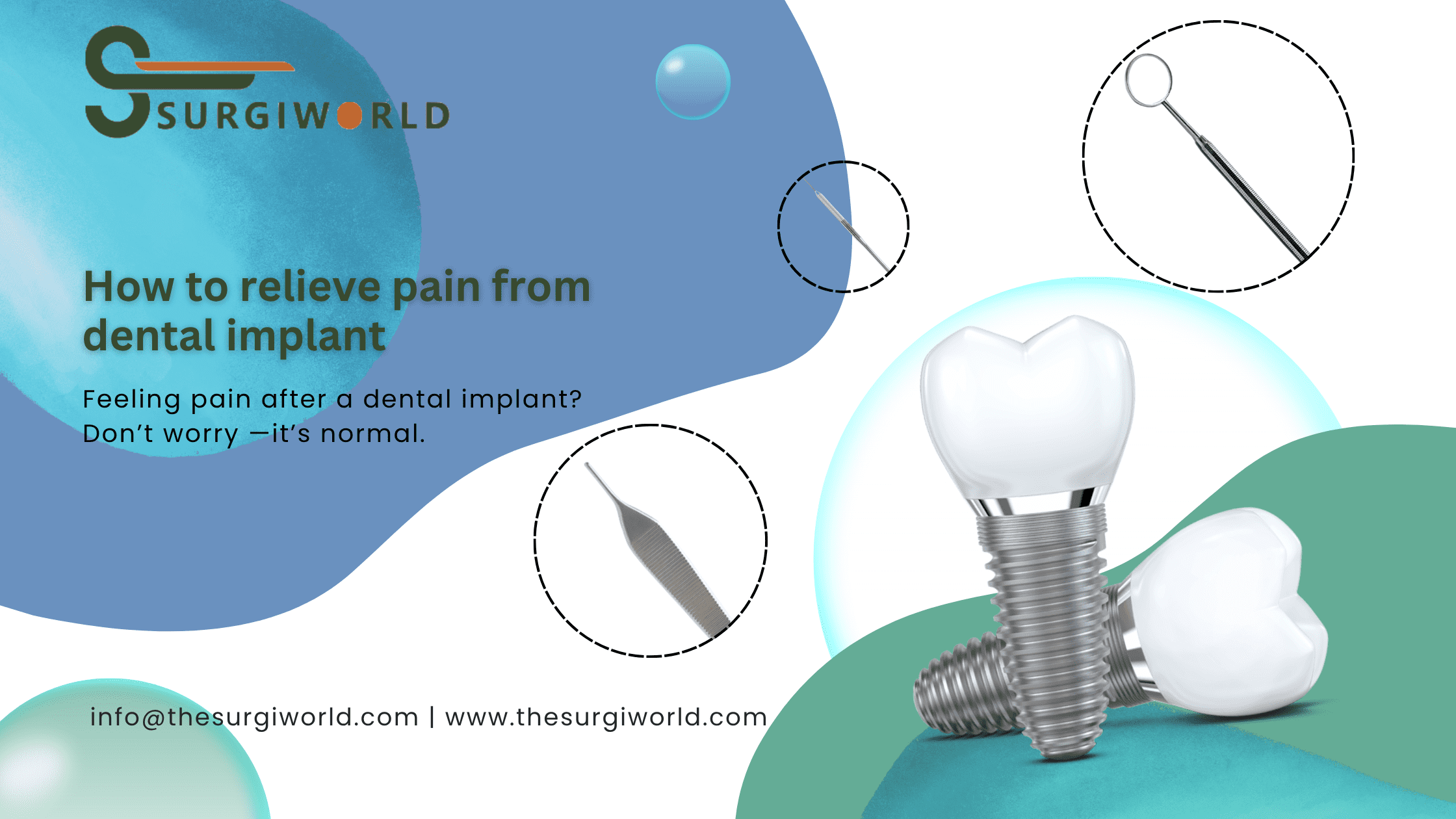
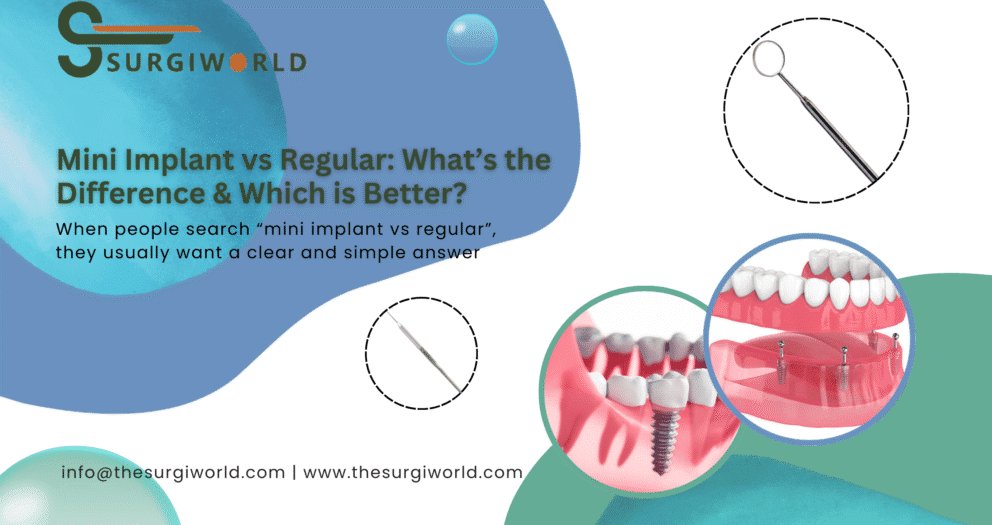
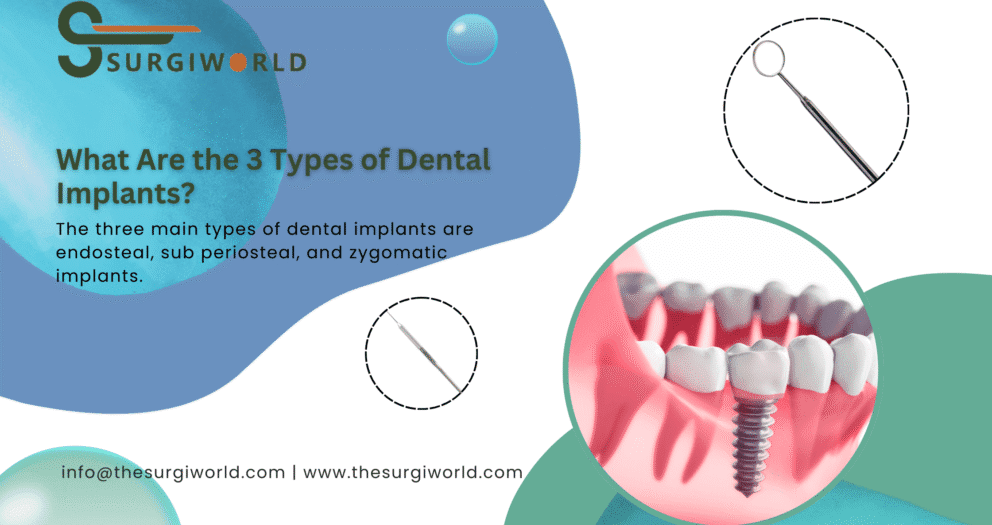
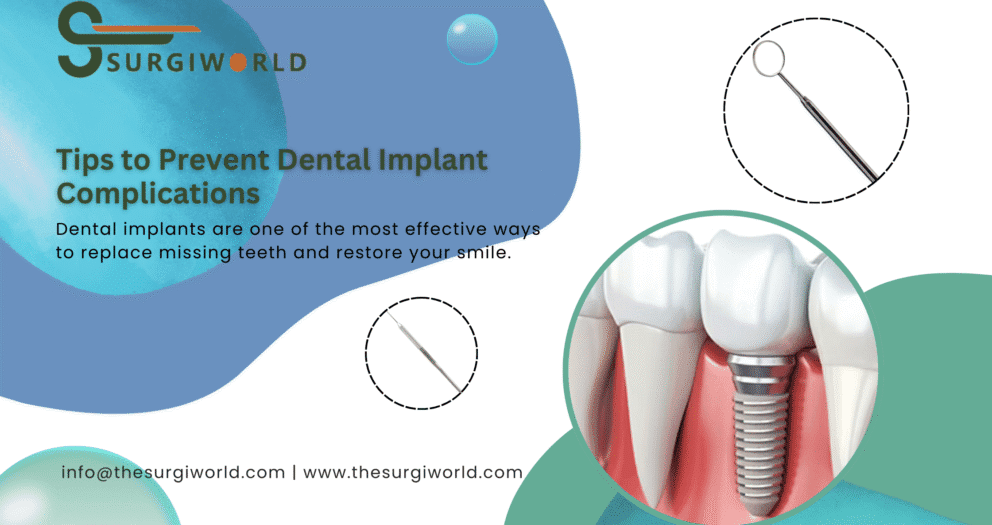
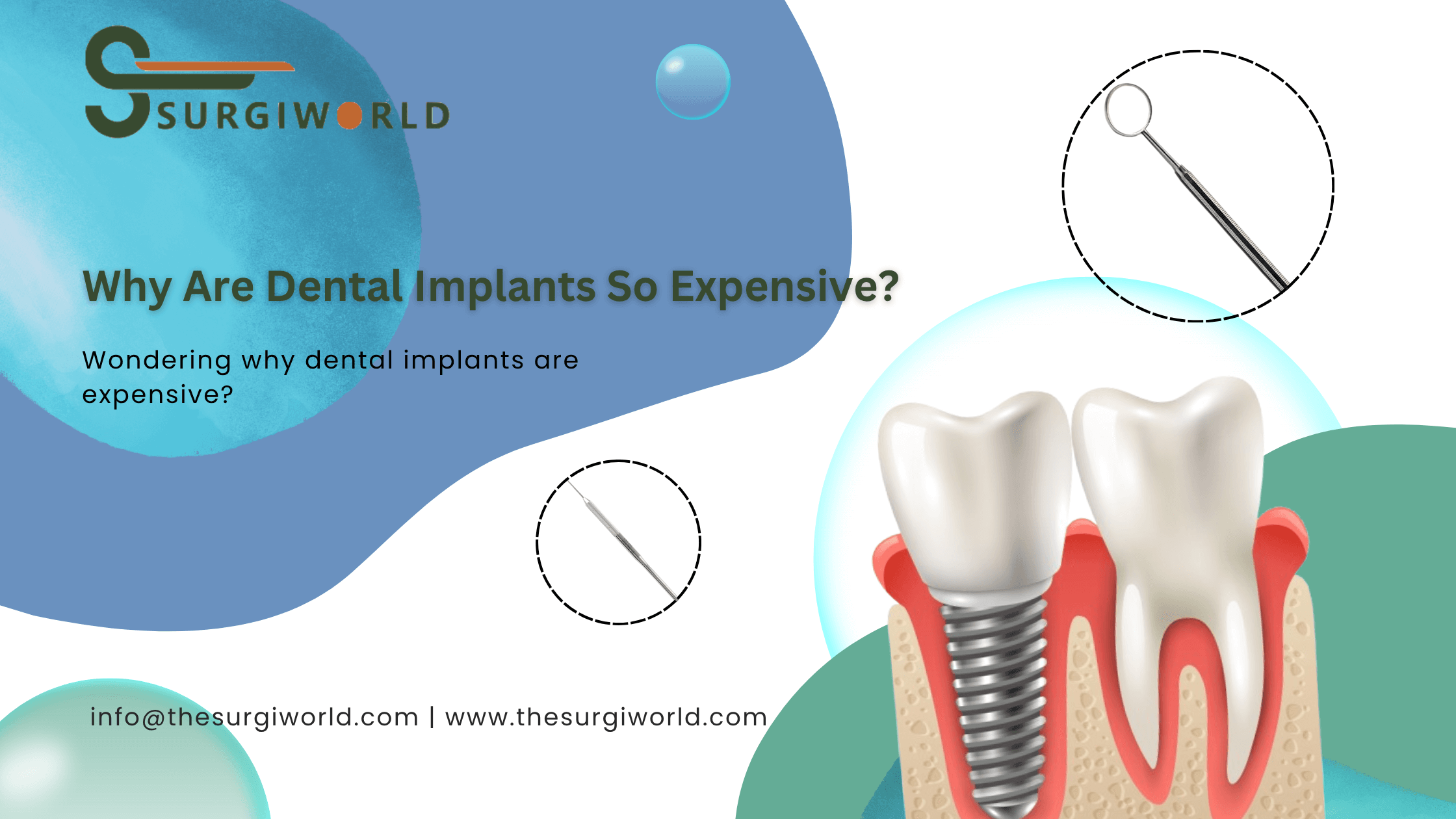

Write a comment
You must be logged in to post a comment.